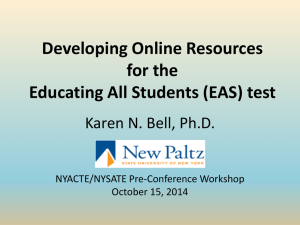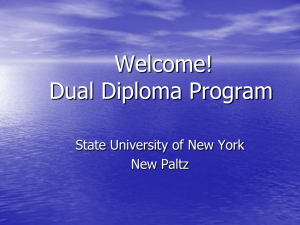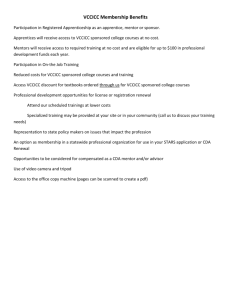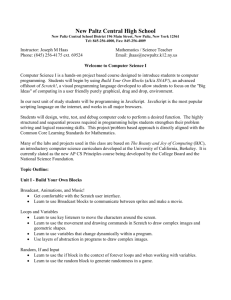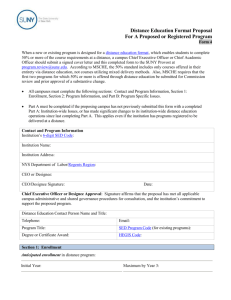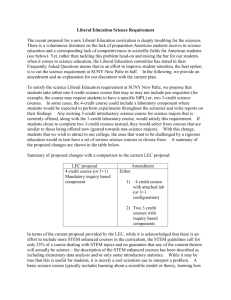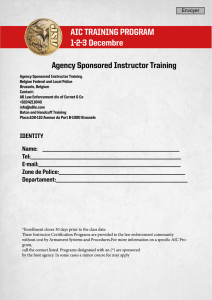BASIC SPONSORED PROGRAM POLICIES
advertisement
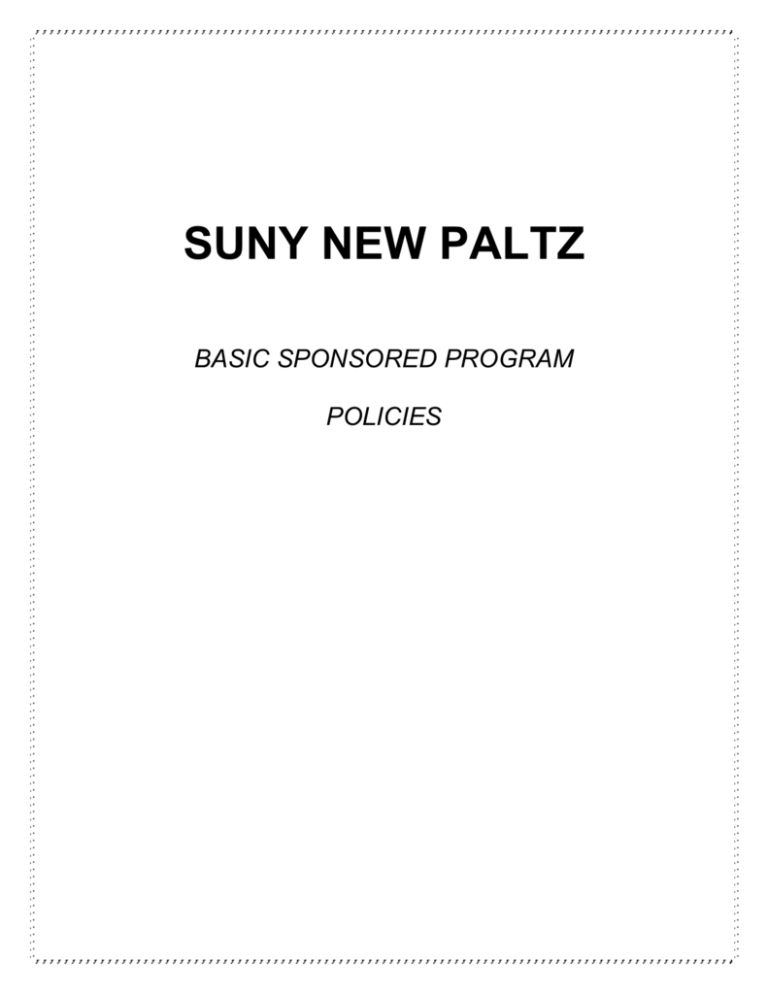
SUNY NEW PALTZ BASIC SPONSORED PROGRAM POLICIES SUNY NEW PALTZ BASIC SPONSORED PROGRAM POLICIES Table of Contents Page No. 3 Lead Agency Project Directors 3 Reassigned Time 3 Extra Service 3 Cost Sharing 3 Summer Effort on Externally Funded Projects 4 Consulting 4 Salary Reimbursement 4 Title F Leave for Fellowship Recipients 4 Human Subjects Policy 4 External Researchers 5 Animal Use Policy 5 Institutional Approval Requirements/Procedures 5 Subaward Procedures 6 Individual Awards 6 Timeframe for Submission to Office of Sponsored Programs (OSP) 6 2 SUNY New Paltz, Office of Sponsored Programs Revised September 20, 2010 SUNY NEW PALTZ BASIC SPONSORED PROGRAM POLICIES LEAD AGENCY When SUNY New Paltz serves as lead agency on an externally sponsored project, the legal applicant is The Research Foundation of the State University of New York on behalf of SUNY New Paltz. The award is made to the institution rather than to an individual. PROJECT DIRECTORS The Provost/Vice President for Academic Affairs appoints project directors. An adjunct, affiliate, or retired faculty member may serve as principal investigator or project director when a full-time faculty member, chair or dean assumes fiscal responsibility for the project. Visiting professors may submit proposals as project directors as long as the proposal clearly states that the individual has a one-year, visiting professor affiliation with SUNY New Paltz. REASSIGNED TIME A maximum of 50% effort may be committed to sponsored projects by faculty members with approval of the dean and provost. Each faculty member must teach a minimum of three courses (9 credits minimum or equivalent) per academic year. Typically, a faculty member will be released from one, 3 credit course for every 20% effort per semester assigned to grant activities. Up to 20% effort may be assigned to grant activities from the research component of the workload. EXTRA SERVICE With the approval of the dean and provost, and in accordance with institutional policy, faculty extra service effort on sponsored programs may be provided on projects other than those supported by federal or federal flow through funds. COST SHARING The normal expectation is that faculty/staff effort will be fully reimbursed by the sponsor. In cases in which cost sharing of salaries may be necessary, the SUNY New Paltz share shall not exceed 50% of project-related salaries. In general, cost sharing is provided from departmental and/or school/college resources and requires approval of affected chairs/deans documented by signature on the Institutional Approval Form (available from the Office of Sponsored Programs.) If any cost sharing is to be provided by an external agency or project partner, a letter or memorandum of agreement signed by an authorized institutional representative of that agency must be provided to the Office of Sponsored Programs before proposal submission. 3 SUNY New Paltz, Office of Sponsored Programs Revised September 20, 2010 SUMMER EFFORT ON EXTERNALLY FUNDED PROJECTS Typically, project directors and other faculty will commit no more than two months full-time effort to sponsored projects in the summer. More than two summer months of full-time effort spent on sponsored projects requires approval of the Provost/Vice President for Academic Affairs. CONSULTING No SUNY employee may receive payments either directly or indirectly for consulting or lecturing services performed on any grant or contract administered at his/her home campus. The policy applies both to academic year and summer periods. SALARY REIMBURSEMENT Salary reimbursement funds generated by grant-funded faculty/staff effort are distributed as follows: 80% to dean of originating unit, 20% to Academic Affairs. TITLE F LEAVE FOR FELLOWSHIP RECIPIENTS Fellowships that provide substantial stipends may qualify faculty members to remain on the state payroll at half salary with Title F leave for the fellowship period. The salary portion of the fellowship stipend is used to reimburse SUNY New Paltz. The Title F-leave-at-half-salary status allows faculty members to continue to receive fringe benefits, e.g. health insurance. A faculty member qualifying for such an arrangement should initiate discussions with his/her chair and dean. HUMAN SUBJECTS POLICY All proposed research activity involving the use of human subjects, or activity involving data collection from, or related to, human subjects must be submitted to the Institutional Review Board (IRB) for review and approval. This policy covers ALL research involving human subjects conducted under the auspices of SUNY New Paltz, to be used by current faculty or staff in any professional activity or publication in which the individual claims an affiliation with the college or to be considered in any review by SUNY New Paltz for faculty/staff retention, merit raise, promotion, tenure, or sabbatical leave. Training in the protection of human subjects is required for all investigators and project staff conducting studies that involve the participation of such subjects. No projects involving human subjects may be conducted until training through an approved program has been completed, documentation certifying such training has been provided to the IRB and to the Office of Sponsored Programs, and IRB approval to conduct the project has been received. 4 SUNY New Paltz, Office of Sponsored Programs Revised September 20, 2010 EXTERNAL RESEARCHERS External researchers may be granted institutional approval to solicit involvement of SUNY New Paltz subjects in studies. Approval decisions will be made on a case-by-case basis, judging the benefit to New Paltz students and faculty vs. risk and resource issues. The procedures for seeking approval are available at http://www.newpaltz.edu/sponsored_programs/extresearcherappproc.pdf ANIMAL USE POLICY SUNY New Paltz and its faculty may receive funding through grants, contracts, and sub-awards for the purpose of carrying out research and/or instruction using institutionally approved animals and conditions. Only animals as listed within the animal use policy statement of SUNY New Paltz may be used for research and instructional purposes: Invertebrates and other cold-blooded animals may be utilized for appropriate faculty and/or student research and teaching purposes. It is the responsibility of the applicant to demonstrate and of the AUCC to verify that necessary facilities are available before a project proposal is approved. Fish may be studied in situ (e.g. observed, sampled, and/or collected) and, if required for the completion of the research project, maintained in suitable holding facilities on or off campus. Fish shall be handled and processed according to the guidelines established by the American Fisheries Society and American Institutes of Fisheries. Any species may be studied observationally within their natural habitat. No live warm-blooded animals may be employed for research and/or teaching purposes on campus if laboratory holding facilities and/or veterinarian care would be required. INSTITUTIONAL APPROVAL REQUIREMENTS/PROCEDURES Institutional approval is required prior to submission of all applications for grants, contracts, subcontracts, cooperative agreements, and fellowships or other individual awards. When estimated budget figures are required in letters of intent, letters of inquiry and pre-proposal documents, institutional approval must be obtained prior to submission. The institutional approval process begins with budget review and approval by Office of Sponsored Programs’ staff. Approval is documented on the Institutional Approval Form available in the Office of Sponsored Programs. Chair and dean signatures are required for all faculty and staff named as project participants in the proposal. The Supplemental Signature Form will be used as required for multiple signatures. In order for chairs and deans to receive proper notification for planning purposes, ALL signatures are required for revised budgets. 5 SUNY New Paltz, Office of Sponsored Programs Revised September 20, 2010 SUBAWARD PROCEDURES A project conducted in collaboration with an outside institution that serves as the lead agency must comply with the institutional approval requirements/procedures described above. A subaward proposal with budget must be submitted to the collaborating institution after SUNY New Paltz review and approval. Adequate time must be allowed for incorporation of the New Paltz scope of work and budget into the proposal narrative and budget of the lead agency. A recommended format for a subaward proposal is available on the Office of Sponsored Programs website: http://www.newpaltz.edu/sponsored_programs/proposaldevguides.html INDIVIDUAL AWARDS Awards such as fellowships may be made to individuals rather than to the institution. Proposal applications for such awards require institutional approval in order to ensure compliance with Federal and State regulations such as the use of human subjects in research. The Institutional Approval Form, available in the Office of Sponsored Programs, is used to document institutional approval. TIMEFRAME FOR SUBMISSION TO OFFICE OF SPONSORED PROGRAMS (OSP) The Office of Sponsored Programs should be contacted as soon as a decision to submit a proposal is made. Adequate lead time must be allowed in order to ensure submission of all faculty and staff applications by required sponsor deadlines. For all electronically submitted applications, the minimum number of days in advance of sponsor deadline for application actions will be according to the scheduled below. Applications must be complete with final documents submitted to OSP 4-5 business days prior to the sponsor deadline. Chair and Dean review and approval must be complete, with signatures obtained, 4 business days prior to the sponsor deadline. Provost and VP review and approval must be complete, with signatures obtained, 3 business days prior to the sponsor deadline. Electronic proposals will be submitted at least 2 business days in advance of the sponsor deadline to allow time to correct submission problems. 6 SUNY New Paltz, Office of Sponsored Programs Revised September 20, 2010
